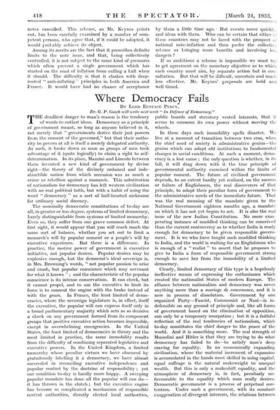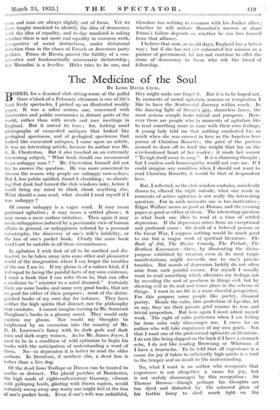Where Democracy Fails
BY LORD EUSTACE PERCY.
Dr. G. P. Gooch will write next week "in Defence of Democracy." THE deadliest danger to man's reason is the tendency of words to outlast ideas. Democracy as a principle of government meant, so long as anyone believed in it, not merely that "governments derive their just powers from the consent of the governed," but that their autho- rity to govern at all is itself a merely delegated authority. As such, it broke down as soon as groups of men took advantage of it (quite logically) to claim a right to self- determination. In its place, Mazzini and Lincoln between them invented a new kind of government by divine right—the theory of the divinely ordained and inde- structible nation from which secession was as much a crime as rebellion against a monarch. This substitution of nationalism for democracy has left western civilization with no real political faith, but with a habit of using the word " democracy " as a sort of half-hearted nickname for ordinary social decency.
The nominally democratic constitutions of to-day are all, in greater or less degree, systems of limited democracy, barely distinguishable from systems of limited monarchy. Even so, they suffer from one grave common defect. At first sight, it would appear that you will reach much the same sort of balance, whether you set out to limit a monarch's will by popular consent or a people's will by executive experience. But there is a difference. In practice, the motive power of government is executive initiative, not popular desires. Popular desires may be explosive enough, but the democrat's ideal sovereign is, in Mrs. Browning's words, "not popular passion to arise and crush, but popular conscience which may covenant for what it knows " ; and the characteristic of the popular conscience is its intense conservatism. It can check, but it cannot propel, and to use the executive to limit its force is to connect the engine with the brake instead of with the gears. in France, the least limited of demo- cracies, where the sovereign legislature is, in effect, itself the executive, the popular will can express itself only in a broad parliamentary majority which acts as so decisive a check on any government formed from its component groups that positive executive action becomes impossible, except in overwhelming emergencies. In the United States, the least limited of democracies in theory and the most limited in practice, the same immobility results from the difficulty of combining separated legislative and executive powers. In the United Kingdom, a limited monarchy whose peculiar virtues we have obscured by gratuitously labelling it a democracy, we have almost succeeded in reconciling executive independence and popular control by the doctrine of responsibility ; yet our condition to-day is hardly more happy. A sweeping popular mandate has done all the popular will can do— it has thrown in the clutch ; but the executive engine has become so complicated a mechanism of responsible central authorities, directly elected local authorities, public boards and statutory vested interests, that it seems to consume its own power without moving the wheels.
In these days such immobility spells disaster. We live at a moment of transition between two eras, when the chief need of society is administrative genius—the genius which can adapt old institutions to fundamental changes in social conditions. At such a moment, demo- cracy is a lost cause ; the only question is whether, in its fall, it will drag down with it the true principle of governmental authority exercised within the limits of popular consent. The future of civilized government depends, to an extent hardly yet realized, on the success or failure of Englishmen, the real discoverers of that principle, to adapt their peculiar form of government to the administrative needs of the immediate future. That was the real meaning of the mandate given to the National Government eighteen months ago, a mandate on which it has not yet begun to act. It is also the real issue of the new Indian Constitution. No more exas- perating instance of muddled thinking can be conceived than the current controversy as to whether India is ready enough for democracy to be given responsible govern- ment. It is we who have taught such muddled thinking to India, and the world is waiting for an Englishman who is enough of a " realist " to assert that he proposes to give to India a form of responsible government strong enough to save her from the immobility of a limited democracy.
Clearly, limited democracy of this type is a hopelessly ineffective means of expressing the enthusiasms which created the nationalist States of modern Europe. The alliance between nationalism and democracy was never anything more than a manage de convenance, and it is now in process of dissolution. Government by one organized Party—Fascist, Communist or Nazi—is in- defensible on any ground of principle and, like all forms of government based on the elimination of opposition, can only be a temporary usurpation ; but it is a faithful reflection of the real tendencies of nationalism, which to-day constitutes the chief danger to the peace of the world. And it is something more. The real strength of Mussolini and Hitler is that they are trying to do what democracy has failed to do—to satisfy man's deep craving for equality. In an economically expanding civilization, where the material increment of expansion is accumulated in the hands most skilled in using capital, equal suffrage is the natural makeweight to unequal wealth. But this is only a makeshift equality, and the atmosphere of democracy is, in fact, peculiarly un- favourable to the equality which man really desires. Democratic government is a process of perpetual con- tention. Under such a government, with its constant exaggeration of divergent interests, the relations between man and man are always slightly out of focus. Yet we have taught mankind to identify the idea of democracy with the idea of equality, and to-day mankind is asking whether there is not more real equality in common work, irrespective of social distinctions, under dictatorial direction than in the chaos of French or American party politics. Primo de Rivera proved the futility of a con- servative and fundamentally aristocratic dictatorship ; but Mussolini is a leveller. Hitler tries to be one, and therefore has nothing in common with his Junker allies ; whether he will imitate Mussolini's success or share Primo's failure depends on whether he can free himself from that alliance.
I believe that now, as in old days, England has a better way ; but if she has not yet exhausted her mission as a pioneer of government, let her not continue to offer the stone of democracy to those who ask the bread of fellowship.







































 Previous page
Previous page